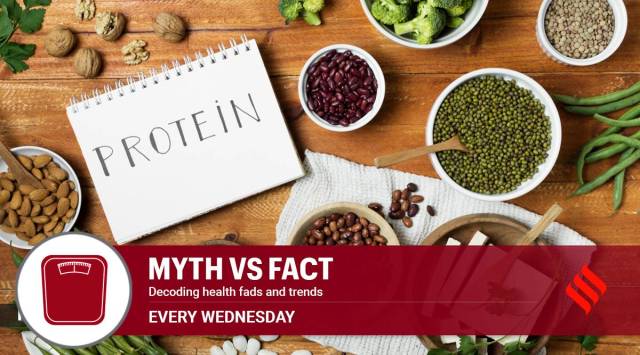Can you get enough protein from plant food?
All plant-based foods contain 20 amino acids, including the nine essential ones, though the proportion of the latter may not be as high as those in animal-derived foods. But if you have a good plant-based food mix that you can have throughout the day, be it legumes, beans, grains, nuts and seeds, you are sorted, says Dr Neeti Sharma, Senior Dietician at Marengo Asia Hospitals, Gurugram
 It is a myth that plant foods cannot be relied upon for meeting your body’s protein requirements. (Pic source: Freepik)
It is a myth that plant foods cannot be relied upon for meeting your body’s protein requirements. (Pic source: Freepik) It is a myth that plant foods cannot be relied upon for meeting your body’s protein requirements. By that logic, ask yourself how herbivorous animals like elephants like rhinos, cows and sheep are getting their proteins. They get it directly from plants. Some of the best plant-based protein sources are lentils, beans, pulses, grains and green vegetables like broccoli. Getting enough protein in your diet is not as big a deal as this question will make you first think it is. Simply be aware of what plant-based foods are protein-rich and try to include them in all your meals.
Myth: People cannot get enough protein from plant-based foods.
Fact: The RDA (required daily allowance) for protein for most people is 0.8 gm of protein per kg of body weight. There are a multitude of plant foods that are rich sources of proteins like tofu, lentils, beans, nuts, seeds, wholegrains, oats, peanuts, peanut butter. Even individuals who require more protein can increase their intake by consuming these foods and complete their quota.
Myth: Plant-based foods are not a complete protein.
Fact: Your body naturally combines plant-based nutrients to form a complete protein. Most plant protein sources provide limited amounts of some of the essential amino acids but it is not necessary to combine foods to create a complete protein. If you eat a variety of foods in every meal, you will get all amino acids.
All plant-based foods contain 20 amino acids, including the nine essential ones, though the proportion of the latter may not be as high as those in animal-derived foods. But if you have a good plant-based food mix that you can have throughout the day, be it legumes, beans, grains, nuts and seeds, you are more than sorted.
Myth: There’s muscle loss with a plant-based diet.
Fact: Consumption of a protein-rich plant diet can build muscle mass as good as animal-based food. Plant-rich vegan diets are had by athletes. It is important to remember that muscle growth is stimulated by strength training also.
Myth: You feel hungry with a plant-based diet.
Fact: Plant foods are low in calorie density but fruits, vegetables, whole grains and legumes are all high in fibre, making you feel fuller for a longer duration. A plant food-based diet provides you hunger satisfaction with a lot of benefits for your gut health and controlling blood sugar levels.
Myth: A plant-based diet is nutrient-deficient.
Fact: Many plant foods provide necessary amounts of vitamins and minerals. We can add fortified plant based foods such as milk, cereals or other varieties of fortified foods for specific additional requirements.
Myth: All plant-based diets are good for health.
Fact: Not the ones which are processed as they contain high amounts of sugar, salt and saturated fats. A plant based-diet, consisting primarily of minimally processed fruits, vegetables, legumes and grains, is best. Also do not use the plant food argument to indulge in French fries, potato chips, onion rings, cupcakes and cereals. Yes, they are all free of animal derivatives but these are not nutritious.
Myth: Dairy is important for strong bones.
Fact: Cow’s milk is not the only best source of calcium. Dark green vegetables, beans, broccoli, mushroom, soybean, figs and some fortified plant milk provide good amounts of calcium.
Myth: Plant based diets are boring.
This is a misconception. You can prepare many recipes with plant-based foods. In fact, vegetables give you different kinds of flavours. Research shows that those on diets high in animal protein are at a higher risk of chronic diseases like cancer, cardiovascular disease and diabetes. Plant proteins do not carry the same risk. They are much higher in fibre and phytochemicals which can protect you from non-communicable diseases.



































